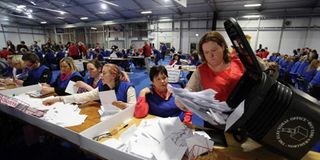We can learn from UK polls

Ballot papers for the Belfast West constituency are sorted by counting staff at the counting centre at the Kings Hall in Belfast, Northern Ireland on May 7, 2015 during the British general election. PHOTO | PAUL FAITH |
What you need to know:
- Kenya is a distinct country operating in a different political climate, but it subscribes to the basic principles of democracy.
- It can, therefore, learn important lessons from the UK elections.
The recently concluded UK elections, in which the Conservatives won by a clear majority and the opposition Labour performed worse than expected, were watched closely by many around the world.
The UK and Kenya have traditionally had strong ties, and it was no surprise that there was local interest in the elections.
However, it was clear from the campaigns to the voting and announcement of results that Kenya and the UK are worlds apart in the way they conduct the crucial democratic process.
For example, the main UK parties clearly articulated their policies, the campaigns were peaceful and maintained a sense of decency while the actual voting, counting and announcement of results was efficient.
The behaviour of the losing candidates was also remarkable. They congratulated the winners while key party leaders, including Labour’s Ed Miliband and Nick Clegg of the Liberal Democrats, took responsibility for their unsatisfactory performance and resigned to make way for new leadership.
Kenya is a distinct country operating in a different political climate, but it subscribes to the basic principles of democracy.
It can, therefore, learn important lessons from the UK elections.
The violence, party-hopping, personality cult, inefficient electoral processes and general bad manners in politics are undesirable practices that we should all work hard to change.





